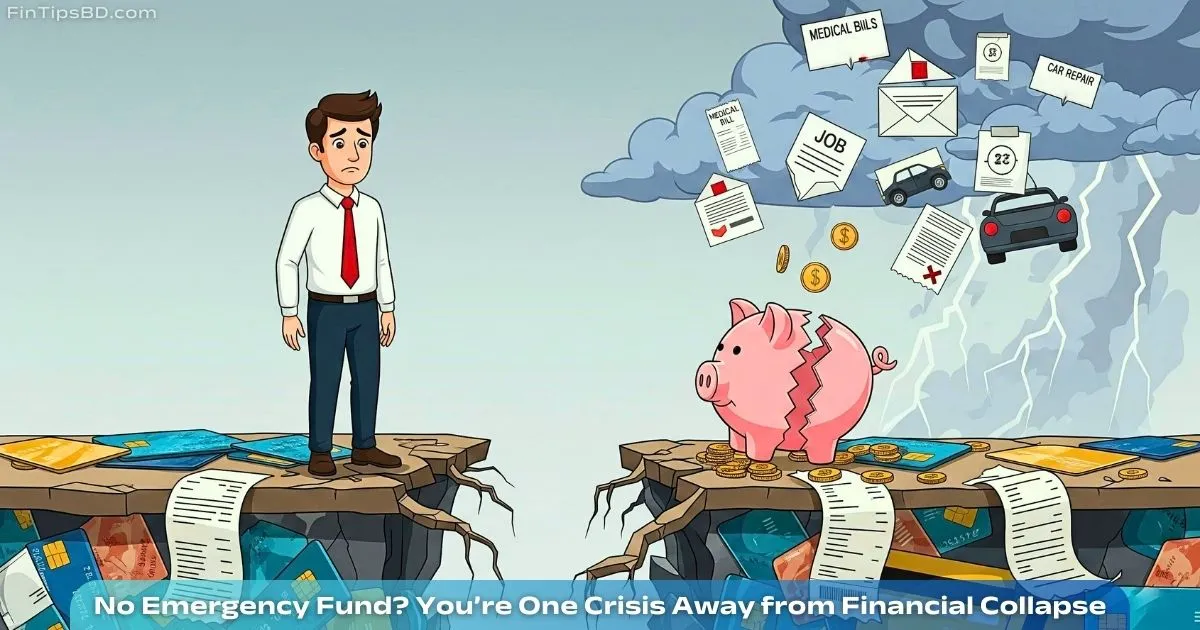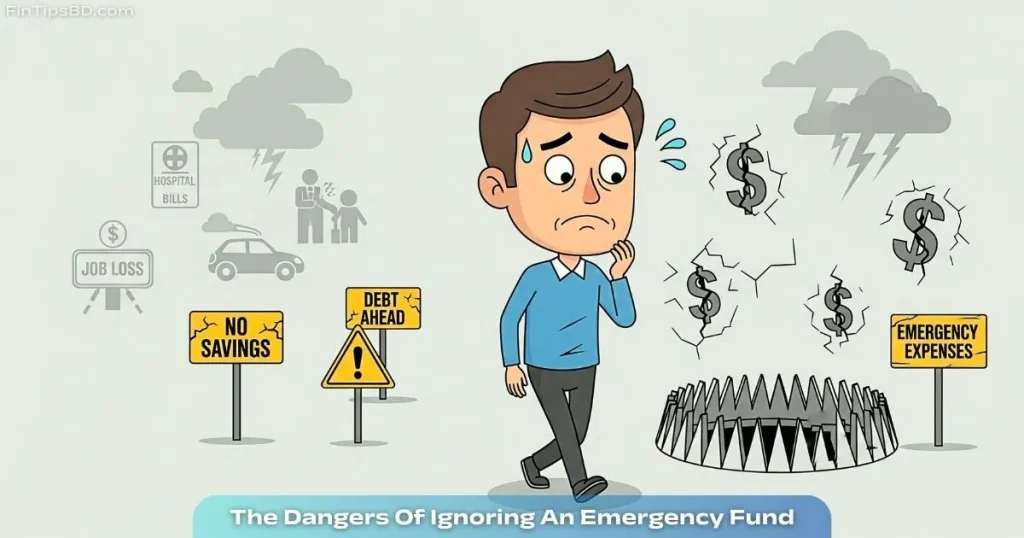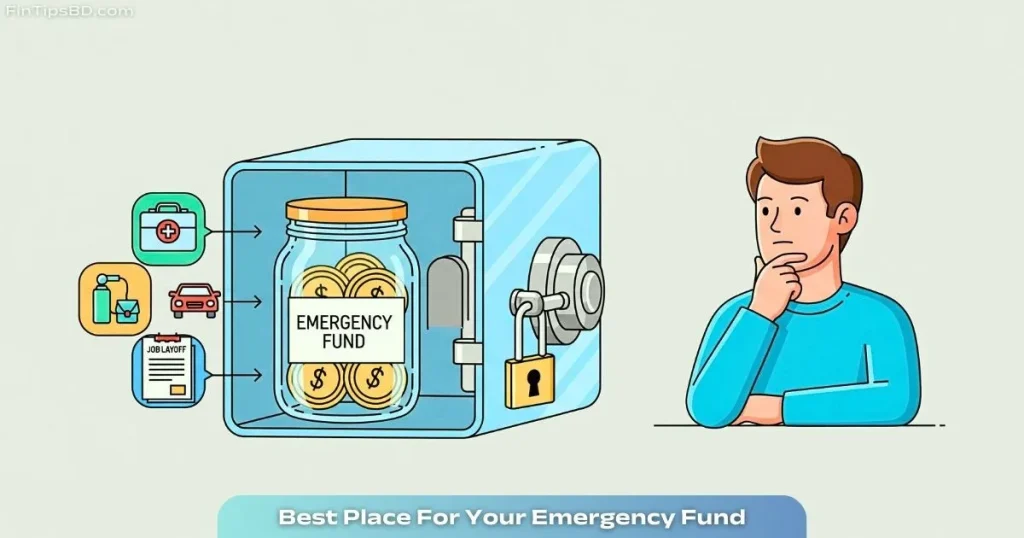Emergency Fund Secrets – Why Not Having One Could Destroy Your Future

An emergency fund is more than just a casual financial recommendation — it’s the backbone of your long-term money stability. Many people assume they’re handling their finances just fine until life throws them an unexpected challenge: a sudden layoff, a health emergency, or a car breakdown when you least expect it. These moments don’t just try your patience; they put your readiness to the test. And if you don’t have a strong financial cushion, things can fall apart quickly.
The reality is that financial emergencies rarely come with a warning. They show up out of the blue. If you’re not backed by an emergency fund, the results can be harsh — often leading to serious debt, intense stress, and putting your life goals on hold indefinitely. But with a clear strategy and a bit of discipline, you can take charge before trouble even begins.
Table Of Contents
What Is an Emergency Fund and Why Is It So Important?
An emergency fund is a separate savings account reserved specifically for unexpected expenses. These may include:
- A surprise medical expense
- Urgent car or house repairs
- Sudden job loss or reduced income
- Unplanned travel for emergencies
- Immediate financial help for family
This account is different from your regular savings or investment funds. It’s not meant for vacations, shopping, or everyday splurges. Its main job is to protect you from life’s unpredictable — and often pricey — disruptions. When used wisely, this account acts as a crucial saving buffer, helping you steer clear of high-interest loans and keeping your financial journey steady. Think of it as your personal crisis fund — always ready when life gets messy.
The Dangers of Ignoring an Emergency Fund

Skipping out on an emergency fund puts you in a risky financial spot. Let’s explore how missing this one critical element can slowly — or suddenly — throw your financial plans off track.
1. One Emergency Can Spiral into Long-Term Debt
If you don’t have emergency savings, your first reaction in a crisis might be to reach for your credit card or take out a personal loan. While that may solve the immediate problem, you’re likely doing so at steep interest rates — often between 15% and 25%. These fees pile up quickly, and soon, you’re stuck in a cycle of growing debt and endless minimum payments.
This isn’t just about big numbers on a bill. Debt adds pressure, limits your options, and can lead to even more poor money decisions. Having a specific stash of emergency money can stop this downward spiral before it begins.
2. Losing Your Income Creates Immediate Chaos
Picture losing your job tomorrow. Could you really pay your basic bills for even one month? For most people, the honest answer is no.
A solid emergency fund allows you to keep paying rent, stay current on utilities, and keep your fridge stocked — all without spiraling into panic. Without it, being unemployed quickly becomes a financial emergency of its own — one that might lead to missed payments, eviction, or even bankruptcy. That’s why having a financial backup plan is absolutely essential.
3. Your Goals May Be Delayed — or Wiped Out
Unexpected expenses don’t just eat up your cash — they can totally sidetrack your dreams. Whether you’re working toward buying a house, launching a small business, or building your retirement savings, an emergency can pause everything. Without an emergency fund, all your big plans hang by a thread.
Your fund serves as a financial cushion — absorbing the unexpected so your long-term ambitions stay intact. It’s a vital part of personal finance protection.
4. The Emotional Toll of Being Unprepared
Living without a money safety net brings a kind of stress that’s easy to underestimate. Constant worry about “what if something happens” can weigh on your mind, strain your relationships, and even hurt your work focus.
Knowing you have emergency savings gives you peace of mind — the kind that lets you make wiser decisions and take thoughtful risks instead of desperate ones. That’s why setting up a rainy day fund is more than smart — it’s essential.
How Much Should You Really Set Aside?
There’s no perfect formula that fits everyone, but a commonly accepted rule of thumb is to save enough to cover three to six months’ worth of your basic living costs. That amount should comfortably handle your:
- Rent or home loan
- Utility bills
- Grocery spending
- Insurance premiums
- Transportation needs
- Minimum debt obligations
If your job is secure and you don’t have many people depending on your income, then three months’ worth might do the trick. But if you’re self-employed, support family members, or deal with irregular earnings, it’s best to aim closer to six months — or more.
Don’t worry if that number feels overwhelming at first. You can start small. Even putting away $500 to $1,000 can be enough to deal with a lot of unexpected expenses and reduce your reliance on borrowing. The key is to begin — that’s the core of learning how to save for emergencies.
Where Should You Keep Your Emergency Fund?

Your emergency fund should meet three major requirements:
- Easy to access: You need to be able to get to the money quickly when something urgent comes up.
- Low risk: Avoid investment options that could lose value — this money isn’t for gambling.
- Clearly separated: Don’t mix it with your daily-use checking account, or it might get spent accidentally.
Here are a few smart and safe places to store your emergency savings:
- High-yield savings account: These accounts offer both safety and a little interest growth.
- Money market account: A solid choice if you want slightly better returns than a regular savings account, but still very low risk.
- Cash reserve at a credit union or bank: Keeps your money nearby and ready to use, without the temptation of everyday spending.
Avoid putting your emergency money into stocks, mutual funds, or anything tied to the ups and downs of the market. This isn’t about building wealth — it’s about keeping your financial backup plan stable, dependable, and there when you need it.
Practical Ways to Build Your Emergency Fund
Even if you’re living paycheck to paycheck, there are realistic and effective ways to begin building your emergency savings.
1. Make Savings Automatic
Arrange for automatic transfers from your checking account into your emergency fund right after payday. Even a small weekly amount — like $25 or $50 — adds up faster than you think. This steady approach is one of the most reliable methods when you’re figuring out how to save for emergencies.
2. Use Extra Income Wisely
When you get a financial bonus — like a tax return, a work bonus, a gift, or income from a side hustle — put a good portion of it straight into your emergency savings. It’s tempting to spend it all, but using windfalls this way can give your fund a big boost with minimal effort.
3. Cut Costs Without Cutting Joy
Find everyday expenses that can be reduced or removed — such as unused subscriptions, ordering takeout too often, or spontaneous shopping. Redirect what you save into your emergency fund. You’re not depriving yourself — you’re choosing to prepare for what life might throw at you. That’s how you strengthen your saving buffer without feeling like you’re giving up too much.
4. Sell What You No Longer Use
You probably have things lying around your home you don’t need anymore. Consider selling old clothes, electronics, furniture, or other items online. Take that money and feed it directly into your emergency stash. It’s a smart way to create emergency money without changing your current income.
The True Value of an Emergency Fund Isn’t Just Financial
While the financial benefit of an emergency fund is clear, its greatest strength may lie in the sense of calm and confidence it brings. When you know you’re prepared for the worst, you stop living in fear of “what if.” Instead of reacting with panic, you can respond with clarity and intention.
You become more willing to embrace opportunity — whether that’s switching careers, moving to a new city, or finally starting that business you’ve always dreamed of. The constant question of “what if something goes wrong?” doesn’t hold you back anymore. Because even if it does, your rainy day fund is ready to catch you.
That’s the real value of personal finance protection. It gives you freedom. Not just freedom from debt, but freedom to move forward — with confidence, purpose, and peace of mind.
Final Thoughts: Don’t Wait for a Crisis to Start Preparing
There’s one truth about life that never fails: it’s unpredictable. You never know when a medical bill, job loss, or family emergency might show up. But you can decide right now whether you’ll be ready for it.
Don’t wait until life throws you into crisis mode to realize how critical an emergency fund is. Start building yours today. Begin with a small amount — even just a few dollars a week — and keep going, one smart decision at a time. Each step you take is a powerful move toward protecting your future.
When you’ve got your emergency fund in place, you’re no longer stuck reacting to life. You’re prepared to rise above it — calmly, confidently, and with your goals still within reach.
Your future is worth safeguarding. And the best time to start doing that is right now.
Keywords: rainy day fund, financial emergency, unexpected expenses, emergency savings, financial backup plan, how to save for emergencies, saving buffer, personal finance protection, crisis fund, emergency money
